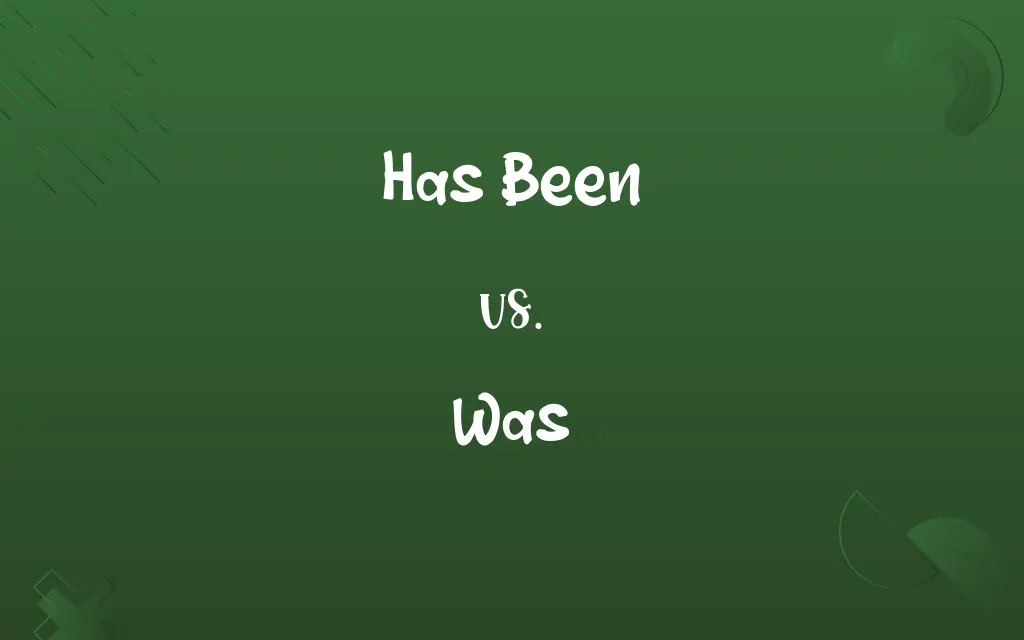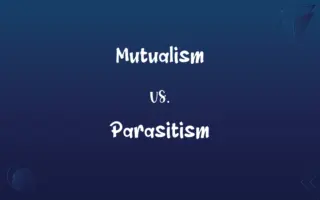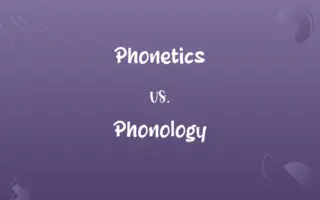Has Been vs. Was: Know the Difference

By Shumaila Saeed || Published on January 12, 2024
"Has been" is a present perfect tense indicating an action started in the past and may continue to the present. "Was" is past tense, indicating an action completed in the past.

Key Differences
"Has been" is used in the present perfect tense, which links past actions or states to the present. It suggests that the action or state started in the past and has relevance or impact on the present. "Was" is the past tense form of "to be," used for actions or states that were true at a specific time in the past and have no direct connection to the present. While "has been" connects past to present, "was" is solely concerned with the past.
Shumaila Saeed
Jan 12, 2024
When using "has been," it often implies the action or state could still be ongoing or its effects are still felt. For example, "He has been working there for five years" suggests he may still be working there. In contrast, "was" clearly indicates that the action or state is completely in the past. For instance, "He was working there last year" tells us that this is no longer the case.
Shumaila Saeed
Jan 12, 2024
"Has been" is often used to describe experiences, changes, or continuing situations. It's about the duration from the past until now. For example, "She has been a teacher for a decade" implies she started teaching a decade ago and is still a teacher. "Was," however, is used for specific times or periods in the past, without implying continuation into the present. For instance, "She was a teacher in 2010" indicates that her being a teacher is confined to the past.
Shumaila Saeed
Jan 12, 2024
The choice between "has been" and "was" can change the meaning of a sentence. "Has been" can imply continuation or current relevance, while "was" denotes completed actions or states in the past. For example, "The park has been closed due to maintenance" might mean it's still closed, whereas "The park was closed yesterday" indicates the action happened and finished in the past.
Shumaila Saeed
Jan 12, 2024
Comparison Chart
ADVERTISEMENT
Time Reference
Past action with present relevance
Action completed in the past
Shumaila Saeed
Jan 12, 2024
Continuity
May indicate ongoing action or state
Indicates action or state ended
Shumaila Saeed
Jan 12, 2024
Example Context
"She has been working here since 2010"
"She was working here in 2010"
Shumaila Saeed
Jan 12, 2024
Implication
Can suggest the action/state is still relevant now
Clearly places action/state in the past
Shumaila Saeed
Jan 12, 2024
Has Been and Was Definitions
Has Been
Implies an experience up to the present.
I have been to Paris several times.
Shumaila Saeed
Dec 20, 2023
ADVERTISEMENT
Was
Past tense form of 'to be' for singular subjects.
She was a renowned artist.
Shumaila Saeed
Dec 20, 2023
Has Been
Used to describe a past action with current relevance.
She has been the best in her class this year.
Shumaila Saeed
Dec 20, 2023
Was
Used for describing past conditions or feelings.
He was happy about the results.
Shumaila Saeed
Dec 20, 2023
Has Been
Refers to a continuous state from past to now.
It has been raining since morning.
Shumaila Saeed
Dec 20, 2023
Was
Expresses an action or state in a specific past time.
I was in New York last summer.
Shumaila Saeed
Dec 20, 2023
ADVERTISEMENT
Has Been
Indicates an action or state that began in the past and continues to the present.
He has been a member of the club for three years.
Shumaila Saeed
Dec 20, 2023
Was
Indicates a state or action that happened in the past.
It was raining yesterday.
Shumaila Saeed
Dec 20, 2023
Has Been
Describes a past action that may still be ongoing.
They have been living in London for a decade.
Shumaila Saeed
Dec 20, 2023
Was
Used in storytelling to set scenes in the past.
There was a castle on the hill.
Shumaila Saeed
Dec 20, 2023
Was
First and third person singular past indicative of be. See Note at you-uns.
Shumaila Saeed
Dec 13, 2023
Has Been
(pejorative) A person, especially one formerly popular or influential, who continues in their field after their popularity or effectiveness has peaked and is now in decline.
Shumaila Saeed
Dec 13, 2023
Was
Used in phrases with existential there when the semantic subject is (usually third-person) plural.
There was three of them there.
Shumaila Saeed
Dec 13, 2023
Was
The first and third persons singular of the verb be, in the indicative mood, preterit (imperfect) tense; as, I was; he was.
Shumaila Saeed
Dec 13, 2023
Repeatedly Asked Queries
Does "was" imply the action is still happening?
No, "was" implies the action or state is completely in the past.
Shumaila Saeed
Jan 12, 2024
Can "has been" indicate a completed action?
"Has been" usually implies continuity or present relevance, not a completed action.
Shumaila Saeed
Jan 12, 2024
Is "has been" used in passive voice constructions?
Yes, "has been" is often used in present perfect passive constructions.
Shumaila Saeed
Jan 12, 2024
Is "was" used for singular or plural subjects?
"Was" is used with singular subjects.
Shumaila Saeed
Jan 12, 2024
Is "was" appropriate for setting a scene in storytelling?
Yes, "was" is commonly used for setting scenes in the past in storytelling.
Shumaila Saeed
Jan 12, 2024
Can "has been" be used for something that just finished?
"Has been" can be used for recent actions with present relevance.
Shumaila Saeed
Jan 12, 2024
Does "was" indicate the exact time of the action?
"Was" indicates the action happened in the past, but not necessarily the exact time.
Shumaila Saeed
Jan 12, 2024
Does "has been" always imply the action is ongoing?
Not always, but it implies the action has relevance or effect on the present.
Shumaila Saeed
Jan 12, 2024
Can "has been" be used without specifying duration?
Yes, "has been" can be used without duration, but it often implies some continuity.
Shumaila Saeed
Jan 12, 2024
Does "was" relate to a specific time?
Yes, "was" is used for actions or states at a specific past time.
Shumaila Saeed
Jan 12, 2024
Can "was" be used for permanent states in the past?
Yes, "was" can describe both temporary and permanent past states.
Shumaila Saeed
Jan 12, 2024
How does "has been" differ from "had been"?
"Has been" is present perfect, while "had been" is past perfect, used for past actions before another past action.
Shumaila Saeed
Jan 12, 2024
Can "was" be used to describe habitual actions in the past?
Yes, "was" can describe habitual past actions.
Shumaila Saeed
Jan 12, 2024
Can "has been" be used to express life experiences?
Yes, it's often used for life experiences up to the present.
Shumaila Saeed
Jan 12, 2024
Can "has been" imply a change over time?
Yes, it can imply a change or development over time.
Shumaila Saeed
Jan 12, 2024
Is "was" used with "yesterday," "last year," etc.?
Yes, "was" pairs with specific past time expressions like "yesterday."
Shumaila Saeed
Jan 12, 2024
Is "has been" used in questions about past experiences?
Yes, it's commonly used in questions about experiences up to now.
Shumaila Saeed
Jan 12, 2024
Does "was" work with past continuous tense?
Yes, "was" is used with the -ing form in past continuous tense.
Shumaila Saeed
Jan 12, 2024
Is "was" used in conditional sentences?
Yes, "was" is used in past conditional sentences.
Shumaila Saeed
Jan 12, 2024
Can "has been" describe a temporary state?
Yes, but it implies the state has some present relevance.
Shumaila Saeed
Jan 12, 2024
Share this page
Link for your blog / website
HTML
Link to share via messenger
About Author
Written by
Shumaila SaeedShumaila Saeed, an expert content creator with 6 years of experience, specializes in distilling complex topics into easily digestible comparisons, shining a light on the nuances that both inform and educate readers with clarity and accuracy.









































































